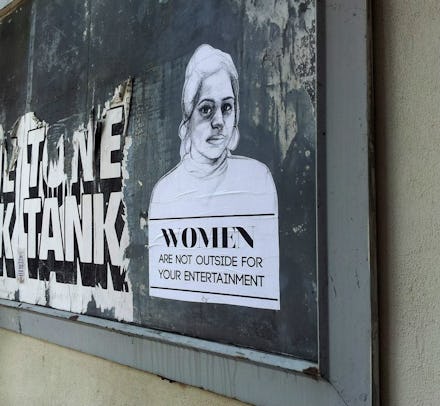Think Street Harassment Is Harmless? This Woman's Experience Proves Otherwise

Women are constantly encouraged to believe they're simply imagining their experiences with everyday sexism. Street harassment is a prime example of this — we're told this degrading, dehumanizing behavior is not a big deal or that it should be received as a compliment. But one New York woman's recent violent experience with catcalling proves otherwise.
A woman was hit on by a man at the Brooklyn Bridge/City Hall subway stop on May 2, Gothamist reported Wednesday. After she ignored him — as women who receive unwanted sexual attention have every right to do — the suspect spat on his target, the New York Police Department told Gothamist.
As if this degrading response wasn't enough, the interaction then turned truly dangerous. The woman laughed at the suspect and, in response, he "took out a sharp instrument, slashed the victim in the arm and then fled the station," the NYPD said, according to Gothamist.
While not every woman has been physically harmed in response to rebuffing street harassment, studies show that catcalling and unwanted come-ons are an all too common experience. A 2014 survey showed, for example, that 65% of all American women had experienced street harassment.
What's more, it seems public transportation spaces are especially rife with sexual harassment, in America and around the world. A large number of stories sent to the organization Hollaback!, which collects women's stories of street harassment, are related to public transportation, noted founder Emily May. In a recent survey of 600 Parisian women, a remarkable 100% of respondents said they had experienced sexual harassment on public transportation, while one 2014 poll found that a third of London women have been verbally harassed on public transportation.
This reality has prompted cities in countries like Mexico and Japan to go so far as to create all-female public transportation options. Campaigns that encourage women to report the harassment they experience have also emerged in recent years: New York's Metropolitan Transportation Authority launched a pro-reporting campaign in 2008, for example, and Transport for London released a similar campaign titled "Report It to Stop It" in April.
But many have questioned whether these options merely address symptoms of this problem rather than challenge the systemic issues of male privilege that allow harassment to continue. Ultimately, it seems, in order to address street harassment — and the type of violent response the unnamed New York woman experienced this past weekend — we need to start a broader conversation, not only about the way we treat women in public spaces, but the still-evident failure of many people to view women as humans deserving of autonomy and respect.
h/t Gothamist